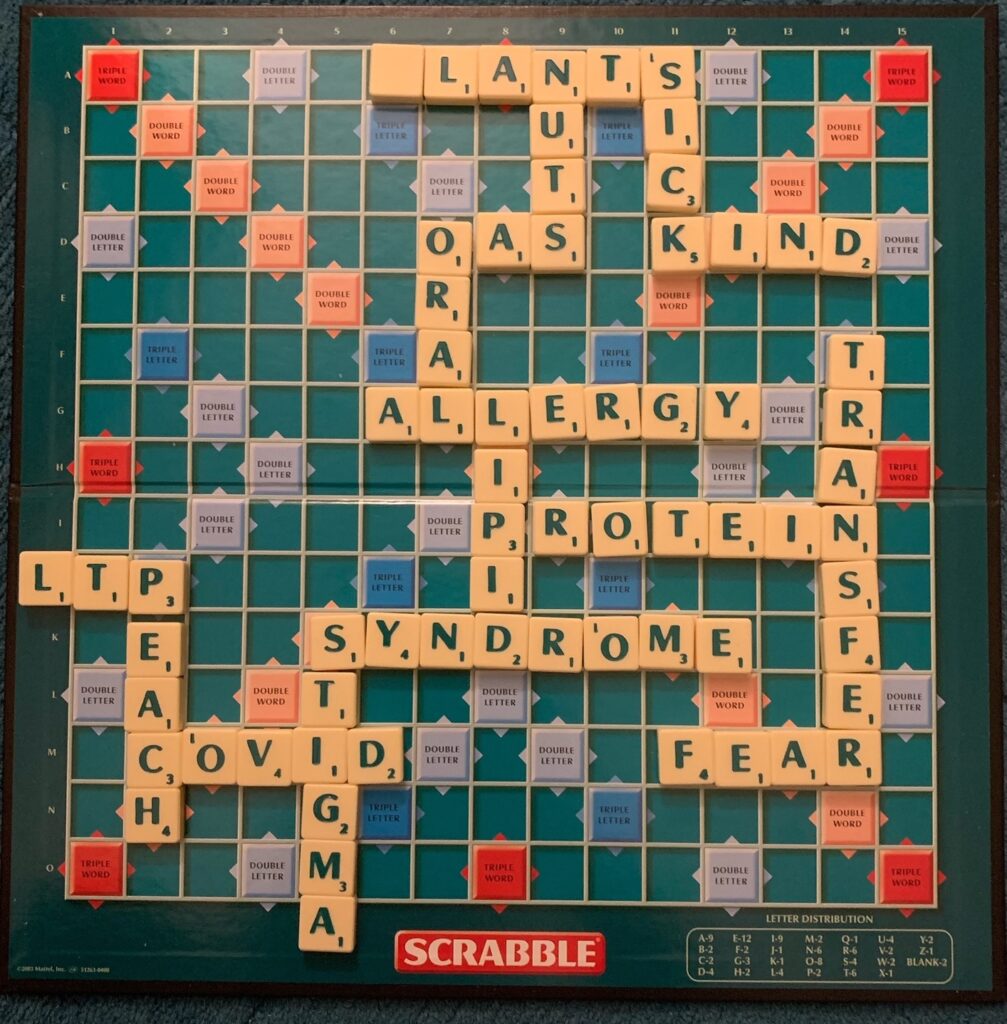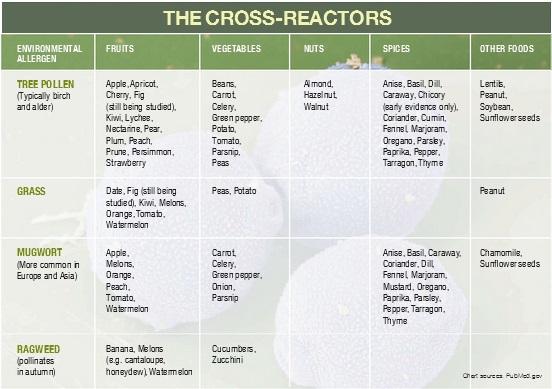I recently attended an online webinar entitled “When plants and allergies collide”, organised by the Anaphylaxis Campaign with Dr Isabel Skypala of the Royal Bromsgrove Hospital presenting.
To say it was an eye opener would be an understatement. I know all about allergies and I thought I knew quite a bit about Oral Allergy Syndrome (OAS) but I’d never even heard of Lipid Transfer Protein (LTP) allergies.
I’m hoping they will make the video of this seminar available to watch back so fingers crossed. If they do I will share the link here.

What is an allergy?
An allergy happens when a person has become sensitised to the protein of a certain food e.g. nuts, milk, wheat. There are 14 allergens listed in the UK that must be labelled on shop bought food and most people understand what allergies are. They can be mild or they can be life threatening. People with anaphylactic reactions to allergens carry adrenaline auto injectors.
We can all get our heads around that. We understand allergies even if we don’t know why the body reacts to these perfectly harmless foods.
What is Oral Allergy Syndrome (OAS)?
Oral allergy syndrome (OAS) or Pollen Food Syndrome occurs when a person is sensitised to pollens e.g. birch and then become sensitive to certain foods which the body confuses with the pollen as they have similar protein make up. This can apply for many fruits, nuts and vegetables and causes usually mild reactions around the mouth, lips and contact allergy reactions on the skin. It does not usually result in an anaphylactic reaction but in rare cases people can have very serious swelling of the throat and breathing difficulties, and will be prescribed an adrenaline auto injector.

What is Lipid Transfer Protein LPT?
Lipid Transfer Proteins (LTPs) are found in plants and foods that contain plants. Lipid Transfer Protein Syndrome is an allergy affecting people who have become sensitised to LTPs. They may thus react to vegetables, fruits, nuts and/or cereals. It is not known how many people have this allergy and it can be very confusing working out which related foods a person might react to. It can also be very serious and some people can have anaphylactic reactions. Testing for allergies would come back negative. There are sophisticated tests that can be done for LTP allergy but these are not readily available or well understood.
So how on earth do you work out what it is you have?
Confused?
Yes. Yes I am!
Visit the Anaphylaxis Campaign website to read their Lipid Transfer Protein allergy handout to find out more.
I’m fascinated by all this and feel it could be the reason so many people slip through the cracks, knowing something is wrong but not being able to get a diagnosis.
Are you confused about whether you have an allergy, an intolerance, oral allergy syndrome or a lipid protein transfer allergy?
Further reading












Hi Ruth,
Reading the title, I directly have a discussion I’d like to being up. The name “oral allergy syndrome”. It makes me itch, every time I hear that term….
I myself have the first discussed syndrome. I however, tend to refer to it as pollen-food syndrome, since some of my reactions have been on the more severe end of the spectrum (an epi has been considered, and maybe used before). I don’t think the term “oral allergy syndrome” encompasses how bloomin difficult and frustrating it is to live with, especially in combination with other food allergies. Referring to the syndrome’s etiology, instead of main-symptom seems much more logical anyhow, whenever trying to explain it to others.
Wishing everyone safe and merry holidays,
Suzanne
Hi Suzanne, thanks so much for this comment. You are so right. All the words we use for these conditions don’t seem to really get across the complexity and seriousness of them. Allergies can mean anything from hay fever to anaphylaxis. Oral allergy syndrome kind of seems less serious than it can be, The word ‘syndrome’ kind of implies it might not really be a thing, like it’s a passing phase or something. And it can cause anaphylaxis, as I recently discovered. I do know another lady who gets anaphylaxis to OAS. I have heard the term pollen allergy syndrome too but even that isn’t a great description. I think the complicated and confusing thing is that you could have all three! So confusing for you and impossible to explain to anyone. Happy Christmas to you too. Stay safe, xxx
I just wrote a really detailed reply and so this one isn’t going to be so good. So frustrating when this happens. It’s so complicated because you could have an allergy, OAS and LTP at the same time. And none of these are easy to explain or understand. None of these words really explain what they cover. Allergies can mean anything from hay fever to anaphylaxis and all three conditions can lead to anaphylaxis, which is thankfully rare. I also agree, OAS and PAS don’t really explain the condition. So confusing. Thanks so much for this lovely comment. Stay safe. Happy Christmas and New Year to you.
Dear Ruth,
This is a great topic to cover. It is unsurprising that some UK allergy services that are doing their best but lack the staff (especially an allergy dietitian) and advanced knowledge and regular such complex cases don’t pick LTP allergy up. Certainly this will be an issue more in centres where the lead doctor for allergy is say a respiratory, dermatology etc consultant and not specifically trained over years from senior junior doctor for a minimum of 6 years in allergy before becoming an “Allergist”.
One may be tempted to blame the non-allergists, however they are mostly historic “volunteers” who stood up to the plate when they saw the continued increase in patients with allergy in the 90’s. Their knowledge came from scientific conferences, a lot of reading allergy papers and visits to established clinics for training. Many have taken Allergy qualifications from Southampton or Imperial Universities, i.e. post grad’ certificates, degrees or MSc’s. They are usually very good.
So, though there is an excellent Royal College of Physicians group “Improving Quality in Allergy Services” (IQAS) that sets national standards for what an allergy clinic needs to consist of including types of staff, qualifications, safety, range of services, patient feedback etc, there is still variability across the UK currently. Only a few places per year are open for doctors wanting to become an Allergist, hence the ongoing problem.
LTP is complex and so any factual public discussion of it to raise awareness is most welcome. Thank you Ruth for bringing this up in your blog.
Thanks Andrew, it is very complex isn’t it! I was absolutely fascinated by the talk. And what you say about the number of true Allergy Specialists is a sad fact. I myself have never seen a real expert, I see a dermatologist and whilst he is very supportive and helpful it’s not his specialism. How do we get more of them? What can we do about this? When the NHS is on its knees with the current covid crisis allergies don’t seem so important. If we can get through this with our NHS system still intact .. please god we do. I’d never even heard of LTP until I last month so it’s certainly not openly understood> I need to rewrite the book already! LOL.
With access to Central BioHub’s high-quality, well-documented allergy samples, scientists are equipped to drive forward the development of innovative diagnostics, treatments, and a deeper understanding of allergic diseases.
https://centralbiohub.de/blogs/allergy-research-with-central-biohub-samples